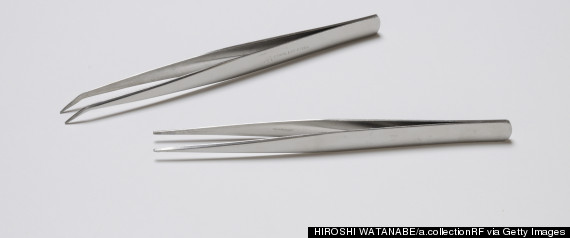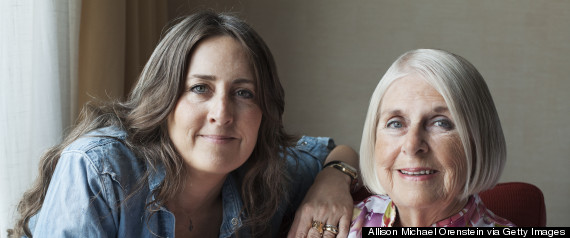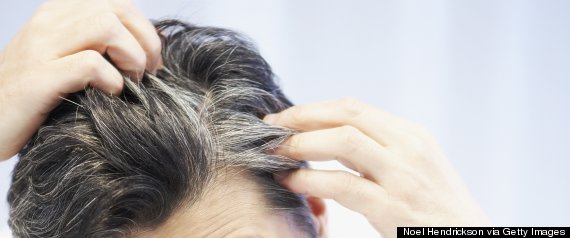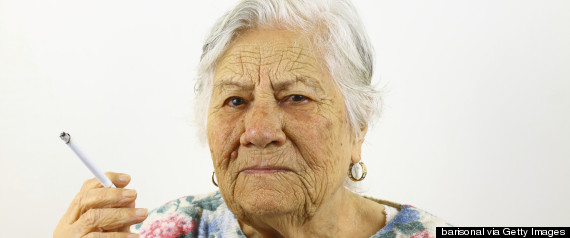There are two groups of aging people. Those who embrace their grays as a badge of gracefully growing older– the ones who end up better looking as a result of a little salt and pepper– and those who live in fear of mirrors and of waking up looking like Cruella Deville. Chances are, if you’re reading this, you’re of the latter.
We’ve all heard plenty of myths about gray hair and have stood in front of the mirror agonizing over whether or not to pluck away the sign of your fading youth. We’ve done the research for you and have debunked the great plucking debate and other common misconceptions about gray hair.
Don’t worry. Plucking one gray will not result in two, three, or seven more. Promise.

Who hasn’t heard this old wives tale? Turns out there’s not a bit of truth to it, cosmetic scientist and author Randy Scheuller told the “Today Show.” Plucking may seem like a good idea, but it won’t remove the hair follicle, and a new hair will eventually grow back in. Scheuller says what you do to one hair won’t at all affect the other hairs around it or make you sprout several more grays. But, don’t pick up the tweezers just yet. Scheuller also warns that plucking the hair can cause permanent damage to the follicle, meaning instead of a gray hair growing back, you might not have one at all! Gray doesn’t seem so bad now, does it?
You won’t “give” yourself gray hair.
At the start of every presidential inauguration people will compare the president’s current hair color to what it was when he was first sworn in or before he started campaigning. It may seem a compelling argument, as many past presidents have gone gray in office, but there’s really no scientific evidence to back up the claim.
Stress doesn’t cause you to gray, but it can cause temporary hair loss, known as telogen effluvium, dermatologist Howard Brooks told CNN. Telogen effluvium causes the hair to fall out and when hairs grow back, they’re often less pigmented than the original, and can eventually turn gray. Stress contributes, but doesn’t actually cause your graying.
You can go ahead and blame what your mama gave ya.

If you’re blaming your teenage kids for stressing you out and turning you gray, think again. It’s your parents you can blame for mother nature’s gift. Gray hair is based on genetics, although certain lifestyle habits can speed up when it shows up, trichologist Elizabeth Cunnane Phillips told The Huffington Post. So if you’re wondering how soon you’ll gray, look at your parents for a pretty good indicator.
Speaking of genes, your ethnicity plays a role in when you gray.
According to the NIH, caucasians tend to gray earlier than Asians and blacks.
The 50-50-50 rule isn’t so accurate.
Graying is age related. Everything starts to change in our bodies as we grow older and our hair follicles produce less melanin, the pigment that gives your hair its hue. Some dermatologists believe that 50 percent of the population at age 50 can expect to have 50 percent gray hair. But a 2012 worldwide survey found that it’s more likely that only between 6 and 23 percent of the population at 50 can expect to have 50 percent gray hair. Phew.
Wondering if excessive dyeing will turn you gray?

You’ve probably used that excuse to scare off your teenage kids from dyeing their hair blue, purple, or any other rainbow-bright colors. But the truth is, whether you yourself believe it or not, this appears to be nothing but a classic old wives tale. Just don’t tell your kids.
The sun plays a role, but isn’t the root of the problem (pun intended).
We now know that the sun is the leading cause of skin aging and wrinkles, but the same doesn’t apply to our locks. In 2009, European researchers finally discovered the true mechanism responsible for graying. Our hair cells naturally produce hydrogen peroxide. But when the cells produce too much, rather than turning us blonde as it would out of a bottle, it turns us gray.
Scientists say everyone’s hair cells produce some hydrogen peroxide, regardless of age. But as we get older, our cells aren’t able to break down the chemical as well.
“The whole mechanism is upset by too much hydrogen peroxide,” researcher Gerald Weissman told Newsweek. Hydrogen peroxide is “a very concentrated form of oxygen. We need oxygen and sunlight to live, but they also bleach us. Maybe the best analogy is that we’re like a color photograph fading to black and white,” Weissman said. But does that mean wearing floppy hats and staying indoors can prevent graying? False. It’s more about what’s going on inside the cells than external factors, Weissman said.
Sigh. If only it were that simple.
However, trichologist Philip Kingsley says gray hair is more susceptible to sun damage, since it has less melanin. So it doesn’t hurt to wear a hat or apply a hair product containing SPF everyday to keep your hair healthy.
Lifestyle choices can help or hurt you.

While you can’t really prevent or reverse graying, there may be simple steps you can take to avoid premature graying. Doctors say low B12 levels can cause lessening of hair pigments. Low levels of pantothenic acid in mice turned their hair gray, in a study by the Linus Pauling Institute.
And lastly, if you smoke, you ought to ditch the habit. Turns out there is truth to the myth that smokers gray sooner. A 2013 study found there is a link between smoking and graying before 30.
